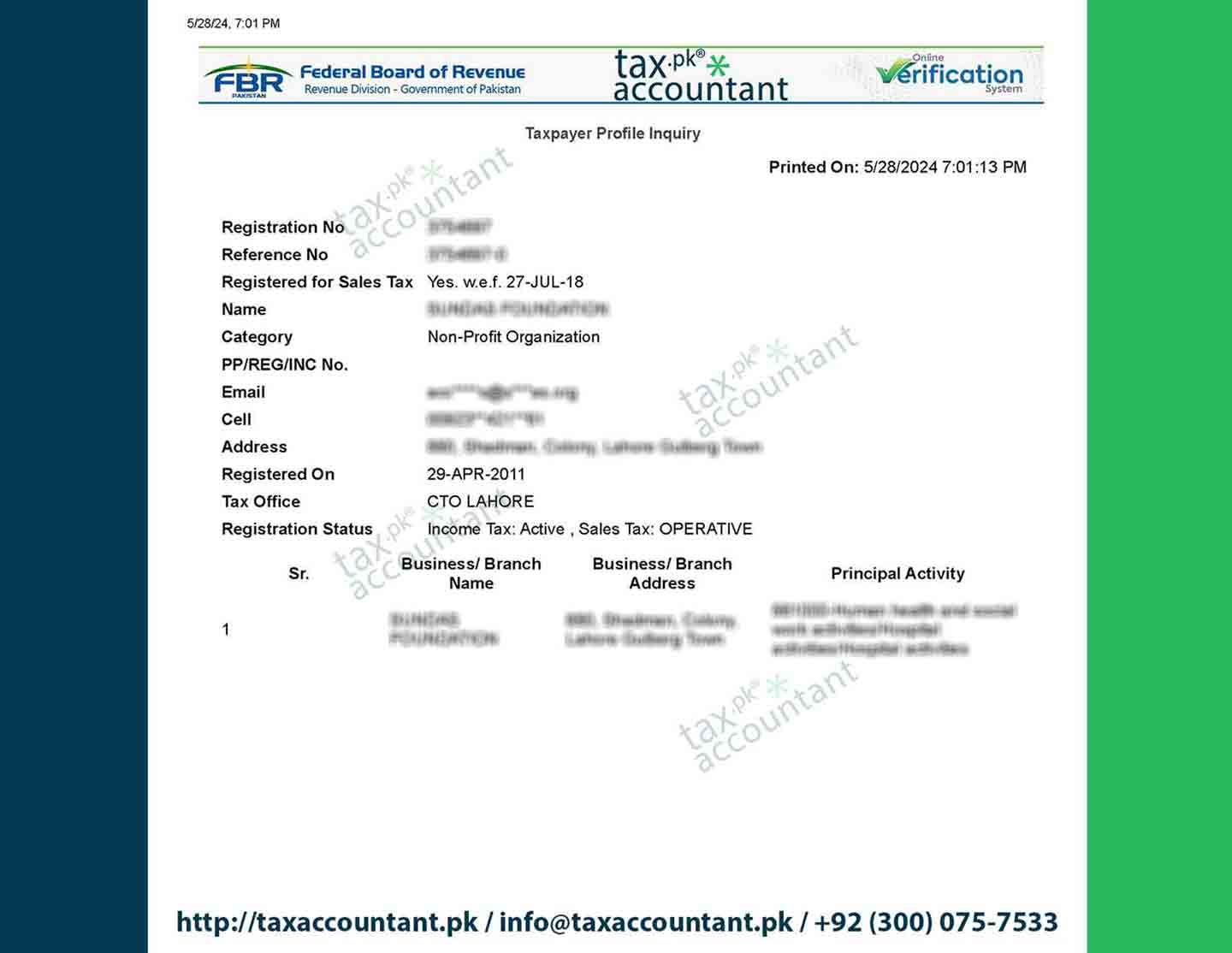Table of Contents
- Introduction
- Understanding Nonprofit Organizations in Pakistan
- Obtaining Nonprofit Organization (NPO) Status
- Registration Process
- Required Documentation
- Tax Benefits for Nonprofits
- Income Tax Exemptions
- Sales Tax and Withholding Tax Exemptions
- Key Requirements for Tax Filing
- Filing Annual Returns
- Documentation and Record Keeping
- Common Mistakes to Avoid in Tax Filing
- The Role of TaxAccountant.pk in Assisting Nonprofits
- Conclusion
1. Introduction
Nonprofit organizations (NPOs) play a crucial role in addressing social, educational, and health-related issues in Pakistan. To support these organizations, the government provides various tax benefits aimed at facilitating their operations. However, navigating the tax filing process can be complex. This article, presented by TaxAccountant.pk, outlines seven essential steps that nonprofits must follow to ensure compliance with tax laws and maximize their benefits.
2. Understanding Nonprofit Organizations in Pakistan
In Pakistan, nonprofit organizations are defined as entities that operate for charitable, educational, or social welfare purposes without the intention of generating profit for individuals or shareholders. To qualify for tax exemptions, these organizations must be registered with the Federal Board of Revenue (FBR) and comply with specific regulations outlined in the Income Tax Ordinance, 2001.
3. Obtaining Nonprofit Organization (NPO) Status
Registration Process
The first step for any nonprofit organization is to obtain NPO status. This process involves:
- Legal Registration: Register the organization under relevant laws, such as the Trusts Act, 1882, or the Societies Registration Act, 1860.
- National Tax Number (NTN): Apply for an NTN and a Sales Tax Registration Number (STRN) from the FBR.
- Application Submission: Submit an application for NPO status to the FBR, which must include:
- Certificate of registration
- Memorandum and articles of association
- Audited financial statements
- List of office bearers
- Detailed description of activities
Required Documentation
The following documents are essential for the application:
- Certificate of Registration: Proof of legal status.
- Memorandum and Articles of Association: Outlining the organization’s objectives.
- Audited Financial Statements: To demonstrate financial transparency.
- List of Office Bearers: Identifying key individuals involved in the organization.
4. Tax Benefits for Nonprofits
Nonprofits in Pakistan can enjoy several tax benefits, which include:
Income Tax Exemptions
Under Section 2(36) of the Income Tax Ordinance, NPOs are entitled to a 100% tax credit on their income from donations, voluntary contributions, and other approved sources, provided they meet specific conditions. This exemption allows nonprofits to allocate more resources toward their charitable activities.
Sales Tax and Withholding Tax Exemptions
NPOs are also exempt from sales tax on goods and services directly related to their charitable activities. Additionally, they may be exempt from acting as withholding agents under the withholding tax regime if they meet the criteria set by the FBR.
5. Key Requirements for Tax Filing
To maintain their tax-exempt status, nonprofits must adhere to several key requirements:
Filing Annual Returns
NPOs are required to file annual income tax returns with the FBR. This filing must include:
- Total income and expenditures
- Detailed accounts of donations received
- Compliance with withholding tax obligations
Documentation and Record Keeping
Proper documentation is vital for compliance. NPOs should maintain:
- Accurate financial records
- Receipts for all donations
- Documentation of expenditures related to charitable activities
6. Common Mistakes to Avoid in Tax Filing
Many nonprofits encounter challenges during the tax filing process. Common mistakes include:
- Failure to File on Time: Missing deadlines can result in penalties and loss of tax-exempt status.
- Incomplete Documentation: Submitting incomplete or inaccurate documents can lead to delays in processing.
- Exceeding Administrative Expenditure Limits: NPOs must ensure that their administrative expenses do not exceed 15% of total receipts.
7. The Role of TaxAccountant.pk in Assisting Nonprofits
At TaxAccountant.pk, we specialize in providing comprehensive tax services tailored for nonprofit organizations. Our expertise includes:
- Tax Filing Services: We assist in preparing and filing annual tax returns, ensuring compliance with all regulations.
- Consultation Services: Our team provides guidance on maximizing tax benefits and maintaining proper documentation.
- Audit Support: We offer support during audits to ensure that all financial records are accurate and compliant.
By partnering with TaxAccountant.pk, nonprofits can focus on their mission while we handle the complexities of tax compliance.
8. Conclusion
Navigating the tax filing process is essential for nonprofit organizations in Pakistan to ensure compliance and maximize their benefits. By following these seven essential steps, NPOs can effectively manage their tax obligations and focus on their charitable missions. For expert assistance, consider reaching out to TaxAccountant.pk, where we provide specialized services for nonprofit organizations to help them thrive.
FAQs
Are all NPOs exempt from income tax in Pakistan?
Most NPOs are exempt from income tax on their core charitable activities, but they may be liable for tax on unrelated business income.
What is unrelated business income? pen_spark
Unrelated business income is income generated from activities that are not substantially related to the NPO’s tax-exempt purpose.
How can I ensure my NPO maintains its tax-exempt status?
Timely and accurate tax filing, transparent financial reporting, and adherence to regulations are essential for maintaining tax-exempt status.
What is the deadline for filing annual income tax returns for NPOs?
The deadline is typically September 30th of each year.
Can TaxAccountant.pk help with obtaining tax exemptions for my NPO?
Yes, we can assist you in understanding the eligibility criteria for tax exemptions and applying for them with the FBR.


